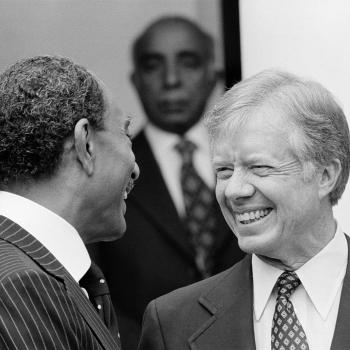For those of us who are still a bit confused about what the post-modern, emergent church is, can you provide a brief summary? Where does the emergent movement stand today?
I think there is a very significant, very deep, very far-reaching movement forming. I think it's still in its earliest stages, still more of a conversation than a movement. It's funny for me to hear some people saying it's over, it's dead, and so on, because I don't even think it's yet begun. Some evangelical gatekeepers seem to be in the process of shutting the conversation down on their turf, which will force people who can't abide by the status quo to migrate elsewhere or simply to ignore those gatekeepers.
The mainline churches are beginning to open up to the conversation, and time will tell how far it goes there. I sometimes think that the most far-reaching dimensions of what is emerging will happen in Catholic and Pentecostal communities, and maybe even among Eastern Orthodox Christians, although they don't share some of the critical problems the West is struggling with. Because I see what is emerging as very broad-based, grass roots, and as-yet embryonic, I don't even call it "the emerging church," because that suggests something far more defined and formulated than I see at this point.
But what I see forming is very exciting and promising, even in these early stages. In short, I think it's an approach to Christian faith as a way of life, focused on Jesus and his message of the kingdom of God, dedicated to spiritual formation for integral mission, meaning mission that addresses all areas of life.
Where do you see signs of hope in the mainline Church ... and the Church in general?
Let me answer that on two levels. First, I feel so privileged because I've had the chance of meeting many heads of communions and leaders in the church here in the U.S., and abroad as well. And what I've seen inspires me. They go by many names --bishops, moderators, district superintendents, general secretaries -- but they are people of spiritual depth, intellectual acuity, interpersonal skill, and moral character. They have a tough job on their hands, facing real problems and obstacles, but I believe God has blessed us with the kinds of leaders we need for such a time as this.
Second, on the grass-roots level, there are tens of thousands of Christians who aren't waiting for denominational leaders to fix things. They're just getting on with it. They're doing it, living it, making it real in their lives, in their neighborhoods, through small groups and mission trips and so on. When you have leaders at the top working for needed change, and people at the grass roots doing the same, and when you're confident that the Holy Spirit is behind it all, eventually the tide will turn and a new day will come. I can't help but be very optimistic.
This week in the Patheos Public Square, we're looking at the subject of Conversion from multiple faith perspectives. What does the concept of conversion look like in your "new kind of Christianity"? As people on a quest, is there one moment of conversion, or many?
First of all, I think more and more of us believe in religious freedom. We believe that if a person is brought up in one religion, but that religion does not bear good fruit in his or her life or community, he or she should be able to change faiths. Second, I think more and more of us believe in religious renewal, meaning that if religious traditions are going to be living rather than dead, change should be an option. So people can change religions, and religions can change ... and that creates a very dynamic future.
And third, I think more and more of us understand that in a pluralistic world, a religion is valued on the basis of the benefits it brings to its non-adherents. If it brings blessings to insiders but trouble to everyone else, we would tend to see the world worse off for this religion's presence. But if it brings blessings to both insiders and to everyone else, we would tend to see the world better off for this religion's presence.
So I would hope we would see lots of conversions ... people migrating toward the faith communities that do the most good for the most people, and that bring out the best in the most people. And I would hope that more and more faith communities would experience an ongoing conversion themselves, becoming more and more of what God wishes they would be.
One last question. You are in high demand as a speaker and travel much of the year. You also write, give interviews, have a family, and worship with your own faith community. How do you remain close to God in the midst of your busy life? What are the spiritual practices that ground you from day to day?





